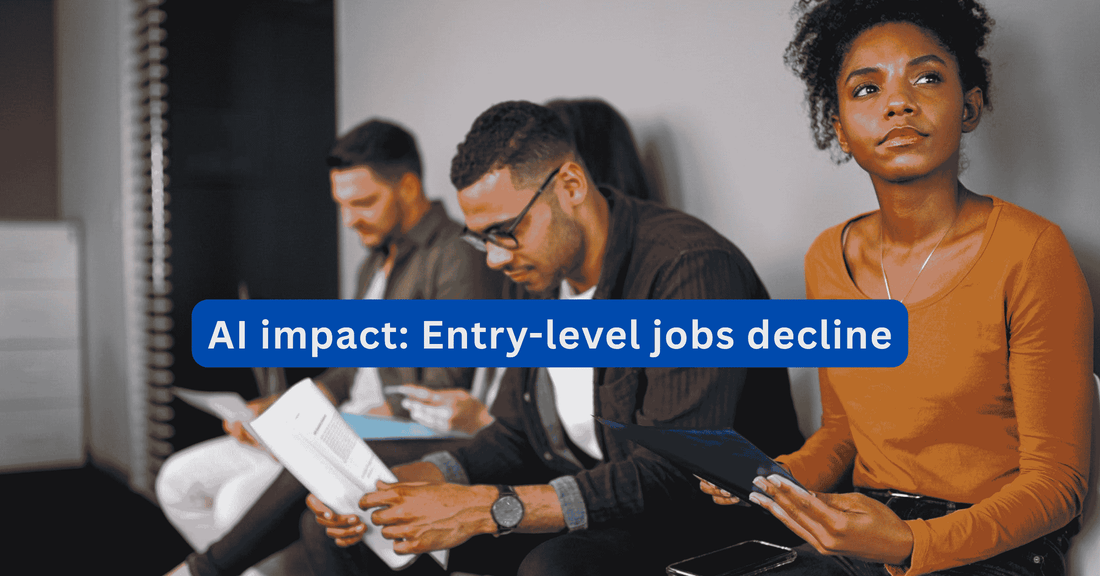AI impact: Entry-level jobs decline, Stanford study reveals
Kenji TanakaStanford study reveals AI is significantly cutting entry-level jobs, especially in software and customer service, impacting young workers aged 22-25.

A recent Stanford University study has revealed a concerning trend: entry-level jobs in AI-exposed fields are declining. The study, analyzing millions of payroll records, indicates a 13% drop in employment for workers aged 22-25 since late 2022.
This shift highlights the increasing impact of AI on the job market, particularly for young professionals entering fields like software development and customer service. The findings suggest a reshaping of the employment landscape, demanding a closer look at how AI is influencing career opportunities for the next generation.
This news underscores the urgent need for young workers to adapt and acquire new skills to remain competitive in an evolving job market. It also raises questions about the future of entry-level positions and the strategies needed to mitigate the negative impacts of AI-driven automation.
As AI continues to advance, understanding its effects on employment becomes crucial for both individuals and organizations.
Highlights
- Stanford study reveals a 13% decline in entry-level jobs for 22-25 year olds in AI-exposed fields since 2022.
- Software development and customer service roles are most affected by AI-driven automation.
- Older workers in the same AI-exposed occupations have seen stable or growing employment.
Read More: Xbox to be like Office: Everywhere, says Nadella
Top 5 Key Insights
• AI Automation Impact: The Stanford study pinpoints that AI automation is significantly cutting opportunities for young workers aged 22-25. These roles, particularly in software development and customer service, are experiencing a downturn as AI technologies become more sophisticated and capable of handling entry-level tasks. This shift indicates a growing need for young professionals to acquire skills that complement AI, rather than compete with it.
• Industry Disparities: The impact of AI varies across different industries. While AI-exposed fields like software development face declines, other sectors such as nursing have seen job opportunities for young workers grow. This contrast underscores the importance of considering industry-specific dynamics when assessing the effects of AI on employment and making career choices.
• Experienced vs. Entry-Level: The study highlights a divide between experienced and entry-level workers. Older employees in AI-exposed occupations have maintained stable or even growing employment, while younger workers struggle. This suggests that experience and specialized skills remain valuable, even as AI transforms the job market, creating a barrier for those just starting their careers.
• AI Augmentation vs. Automation: Companies that use AI to augment human capabilities, rather than automate jobs entirely, are seeing different employment outcomes. The study indicates that businesses focusing on AI as a tool to enhance employee productivity are more likely to maintain or increase hiring, while those using AI for automation are reducing entry-level positions. This distinction emphasizes the importance of how AI is implemented and its impact on job creation.
• Skills Adaptation Imperative: The decline in entry-level jobs underscores the need for young workers to adapt and acquire new skills. As AI takes over routine tasks, the demand for uniquely human skills such as critical thinking, creativity, and complex problem-solving will rise. Educational institutions and training programs must evolve to equip students with these skills, ensuring they remain competitive in the AI-driven job market.
Read More: Jessica Alba's Net Worth: Acting, Business & Real Estate
Expert Insights
Erik Brynjolfsson, Stanford Economist: "Employment has begun to decline for young workers in highly exposed occupations like coding and call centers, but older workers and workers who use AI to augment, not automate work, have seen job gains".
Read More: Chegg Cuts Staff, CEO Replaced Amid AI Disruption
Wrap Up
The Stanford study serves as a wake-up call, highlighting the tangible impact of AI on the employment prospects of young professionals. The decline in entry-level positions necessitates a proactive approach, focusing on skills development and adaptation to thrive in an evolving landscape.
As AI continues to reshape industries, resilience and a commitment to lifelong learning will be essential for navigating the challenges and seizing the opportunities of the future.
Read More: AI Search Engines Favor Less Popular Sources: Study
Author
Kenji Tanaka - A technology futurist and digital strategist based in Tokyo, specializing in emerging tech trends and their impact. He explains complex innovations and the future of digital skills for Enlightnr readers.More to Explore
- Choosing a selection results in a full page refresh.
- Opens in a new window.




